Study Abroad
Why to study abroad?
Studying abroad increases employability. Exchange program boosts your CV and helps you stand out in the job market. Employers consider an international experience to be important for recruitment. In addition, an exchange program will provide you with soft skills like adaptability, taking initiative and proactivity, which are also crucial for future jobs. Furthermore, when you go abroad you will experience different learning and teaching practices. You will get to know new places and people and you will learn more about yourself and how to trust yourself better.
While you are abroad, you remain enrolled as a student of the University of Tartu; the courses you complete there will be credited toward your studies at UT and your studies abroad will be reflected in your graduation documents. You can study abroad for one semester or for an entire academic year at a time. As an exchange student, you will study for free at a foreign university; you may also receive a stipend or other forms of financial support.
The details for planning an international study experience within the Geoinformatics for Urbanised Society curriculum are described as follows:
Which part of my studies can I do abroad?
The courses for specialisation module (18 ECTS) and optional courses (6 ECTS) can be taken either at Estonian or foreign universities as far as these fit the aims of the curriculum, relate to the the Master's Theses topic, and increase the professional development of students. The course list for specialisation module ican be seen in Study Information System. The optional courses module offers students the additional possibility to personalise their learning experience by choosing subjects for at least 6 credit points outside the curriculum. The students are free to take optional courses from various universities in Estonia or abroad. While being abroad you have to take at least 15 ECTS per semester and apply for these to be credited in your UT study programme.
NB! Some host universities may require more credits to be taken
When is the best time to study abroad?
We encourage the students to gain new academic experiences during their studies by spending the third semester abroad as an Erasmus exchange student or by using other mobility options. Therefore, there are no obligatory courses during the third semester. The mobility can be extended up to one year, thus third and fourth semester can be spent abroad, but you have to keep in mind that by spending a full year abroad you cannot finish your studies at the University of Tartu within two years.
What kind of mobility options do I have?
The majority of students at the University of Tartu study abroad with the European Union's Erasmus+ programme, through which specific departments of the university carry out student exchange cooperation. The Department of Geography has more than 40 partner agreements with universities around Europe where you can study as an Erasmus exchange student. You can find the full partners list for the Department of Geography in SoleMOVE (guidelines are available here). Pay attention also to the maximum number of students accepted per year per study levels. The list of partner universities is updated before each competition.
The main application round for Erasmus+ semester studies is usually in February/March. If there are extra places left for some universities, an additional application period for the spring semester takes place at the beginning of September.
From the list of our partner universities, we would like to recommend the following:
- University of Salzburg in Austria offers various courses in geoinformatics (e.g., Visualisation and Cartography, Spatial Analysis, OpenGIS and Distributed GI Infrastructures, Introduction to Geoinformatics, Remote Sensing and Image Processing, etc).
- Palacký University Olomouc in the Czech Republic offers several courses in geosciences (e.g., GIScience for Geographers, Remote Sensing Principles, New Issues of Geosciences, Technologies in Geographic Information Science, Geographical Information Systems, etc).
- University of Twente in the Netherlands offers a broad range of courses in Geoinformation Science and Earth Observation and Spatial Engineering (e.g., Integrated Geospatial Workflows, Intra Urban Spatial Patterns and Processes, Extraction, Analysis and Dissemination of Geospatial Information, etc).
- University of Augsburg in Germany offers many courses in geoinformatics (e.g., Geodata Analysis, Advanced Spatial Analysis, Selected Chapters in Geoinformatics, etc).
In addition to the Erasmus+ programme, there are other options for studying abroad:
- Erasmus+ International Credit Mobility allows students to participate in exchange programs at partner universities outside of the European Union.
- UT has more than 60 partner universities with whom UT has active student exchange agreements.
- ISEP (International Student Exchange Programs) is a worldwide network of universities and colleges organising student exchanges.
When do I have to apply?
When going abroad for the autumn semester in the second year, you have to apply already in spring during the first year. The call for applications for the following academic year is announced in February or March and an additional application period for remaining spring semester spots is held in August and September. If you already know where you would like to go, apply during the first round of applications, as later there might not be any free spots at your preferred university. Keep an eye on the offers on the Competitions Currently Open webpage and on the weekly student newsletter.
Deadlines and required documents for the application process will be available in the competition call. In general, you are required to submit the following: the Erasmus+ application, a letter of motivation, a transcript of records, and proof of proficiency in the language in which you will be studying at the foreign university. Study abroad applications are processed electronically via SoleMOVE system. You will be informed of the results by your Erasmus coordinator by the end of March (for the first application round) or the end of September (for the additional application round).
How to plan my semester abroad?
Before going to study abroad, all students have to draw up a study plan (the subjects that you plan to study at your chosen foreign university) and sign a learning agreement. The study plan has to be discussed and approved by programme director - Madli-Johanna Maidla. After that learning agreement can be signed. Read more about the regulations and paperwork here.
Could I do an internship abroad?
Erasmus+ traineeship grant is meant for a traineeship carried out in EU member countries as well as in Iceland, Norway, Liechtenstein, Turkey, Republic of North Macedonia and Serbia for a minimum period of 2 months (60 days) up to 6 months. Erasmus Traineeship can be also done under the course LTOM.02.054 Work Placement (6 ECTS).
Student experience
"I highly recommend everyone who has the chance to take the mobility window offered by the University of Tartu and spend a semester or two abroad. I chose to extend my studies by one year, as I really wanted to get the most out of my Masters in Geoinformatics for Urban Societies. At the University of Tartu, the studies focused mainly on the geoinformatics aspect of the degree. As I wanted to expand my knowledge in human geography in the second year, I turned to the Erasmus Exchange program and found the perfect courses for me at Lund University in Sweden.
While the process to go abroad can be a little challenging, the struggle is highly worth the reward. My experience at Lund University was nothing short of memorable, including the chance to make many new international friends, as well as to discover a beautiful country while studying at one of the world's top universities. It also gave me the opportunity to see how different universities approach education, as well as to make new professional connections. Overall, it was worth every moment and I'm incredibly happy with my experience!"
Image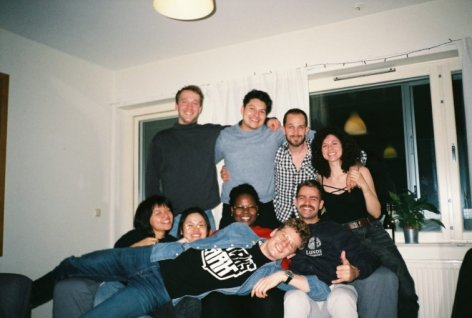
"In the first year of the master’s programme, I was confident about the skills I can learn from the courses which fit with the “Geoinformatics” part of the curriculum. Therefore I decided that in the second year, I could fulfil my interest in the urban realm and focus on the “Urbanised Society” part. Across the partner universities, I found Vrije Universiteit Brussel to be the most suitable study abroad destination for this purpose, with its Urban Studies exchange study field.
The courses I selected were largely focused on socioeconomic urban geography from a critical perspective, but the course offer includes areas such as urban mobility, sustainability and criminology. We also went on several study excursions - not only around Brussels but also to other cities in Belgium. Living and studying in a core metropolitan area is a worthwhile experience for a student who is interested in the contemporary urban condition."
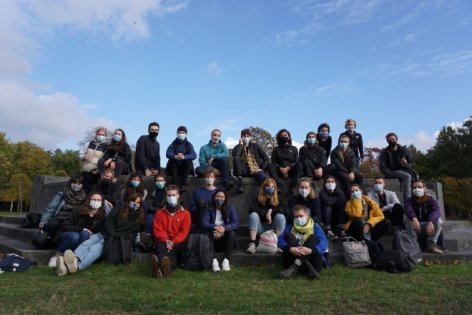
"Initially, I wasn’t confident about using the Mobility window during third semester of my studies. I enjoyed living in Tartu and satisfied with the university program. Plus, I already was abroad and didn’t really want to go through moving and settling again. However, my opinion had changed after I met some foreign students from ERASMUS program in Tartu and talked with older university mates, who returned from their semester abroad. All feedbacks were really exciting and I realized that I have to use such opportunity. I have chosen the University of Salzburg, Austria as a place for studies during third semester. Now it is only one month to be here left and looking back I can confidently say that it has been the 100 percent right decision. I have gained a lot of new experience in studies and professional development as it appeared that the geoinformatics department is very advanced here. It has a great team of teachers and PhD students and is tightly connected with business, so courses focus more on applied and practical aspects of geoinformatics. Apart from studies I have used the occasion to be in the center of Europe to travel around and visit new places as often as possible. Another great benefit to study as an ERASMUS student is meeting a lot of new people and making new friends and connections from all around the world. I will be happy to return here to visit the ones from Salzburg or travel anywhere else where people came from. So, it has been a great and memorable semester and the opportunity which has to be used, while it is available."
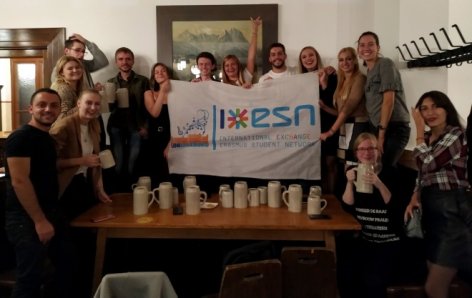
"Studying at University of Tartu has been a wonderful experience for me with lots of unforgettable memories. The opportunity of spending a semester or two abroad even makes it better. Bremen is a multicultural city which makes it attractive and conducive for studies. The department of Geography with emphasis on Environmental History is an excellent programme that blends GIS techniques with climate change and sustainability. If you are passionate in using GIS technique in Earth system modelling and climate change University of Bremen will be an excellent choice to spend a semester during your studies at University of Tartu. The second part of the Course Method of Pre-historic Archaeology in Europe gave me an opportunity to visit one of the biggest megalithic graves in northern Germany that has been preserve for about 4000 years. This was after we had mapping sessions in class and the opportunity to see it first was awesome."
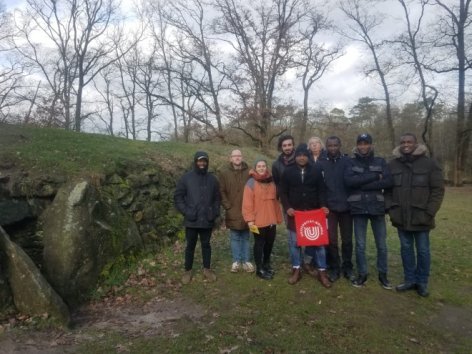
"After my wonderful Erasmus here in Tartu (February 2018), I was sure that staying in this beautiful country is what’s right for me. During my master’s program in Geoinformatics for Urbanised Society, I have never doubted my decision of wanting to do another Erasmus. I have considered a semester abroad an integral part of my studies and a great way to sharpen my communicational skills and equally enlarge my educational spectrum. I spent a lot of time mulling over the choice of the host university, after familiarizing myself with the offered courses in Eötvös Loránd University, Budapest. I was delighted to find a plethora of interesting classes that fit my interests perfectly and go along with my master’s thesis ambitions. Hungary also as a country in central Europe means that I can travel around without worrying about the flight tickets. Putting all this in consideration, I was strongly convinced that Budapest is the right place for me. Spending 5 months in Hungary gave me the chance to strengthen my rudimentary understanding of certain subjects like Photogrammetry and Remote sensing, but it also opened my eyes on a completely new and interesting courses such as Open Source Web GIS Programming. Immerse myself in the Hungarian culture by staying with local families, trying their foods and enjoying famous thermal water spots. Meet new people from different places in the world bringing different experiences and cultural backgrounds. Travel to the neighboring countries like Poland, Slovakia, Czech Republic, Austria and Switzerland I love traveling, meeting new people and taking on new adventures. If you feel the same, then, the invaluable opportunity of doing an exchange is also for you. I also believe that Geography as a study field is best appreciated and perceived when one gets the opportunity of exploring it through diverse cultural and geographical experiences."
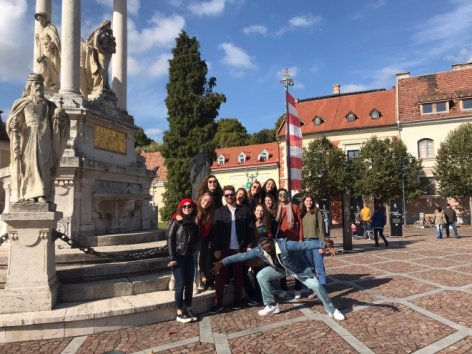
"I spent two Erasmus semesters in Czech Republic last year (in Prague and Olomouc). I recommend everybody going there, especially to Palacky University in Olomouc.
Reasons to choose Czech Republic:
1) Cost of living - you can easily fit to ~300 EUR/month. Prices are similar to Estonian.
2) Center of Europe - easy to travel to best destinations (Vienna, Budapest, Bratislava, Germany, Poland)
3) 75% discount for travels inside Czechia with ISIC - since 2018 all students travel with 75% discount on all buses and trains.
There are plenty of places to visit in Czechia.
4) Student canteens at universities - option, that saves you time on cooking and money on eating out.Reasons to choose Olomouc:
1) University - high quality of courses and teaching (in GIS and related fields). They allow to look at field from different perspective.
2) Cozy and beautiful city - very nice historical center. And almost no tourists (unlike in Prague).
3) Campus - Olomouc is a student city, similar to Tartu. Dorms are very close to university and city center. All buildings and facilities are new or recently renovated."



